
It can sometimes be a struggle to explain why Chainsaw Man is so good, even to those who have become fans of it through the anime. It’s as if they’re eating a peanut butter cup and going, “Wow, this chocolate is good!”
But recent chapters of the manga have shown just how much Denji’s journey has changed him when we see Denji talk about Power, as well as his interactions with the character Nayuta.
MANGA SPOILER WARNING
Part 2 of Chainsaw Man has been fun, especially between having a new perspective character in Asa and the way Denji keeps trying to “accidentally” reveal that he’s Chainsaw Man. The guy is still pretty shallow and dim, but then he starts talking to Asa about a “good friend” he knew, and his words carry a tone both mournful and joyful. Over time, his bond with Power became genuine and full of caring, and the weight that comes with his current maturity can be felt.
Then, when you see him interact with Nayuta (the new Control Devil after Makima), that feeling only multiplies. Denji in Part 1 thinks mostly about himself—a product of his upbringing as an orphan surviving on scraps—but here, he has responsibilities as Nayuta’s guardian. From the little bits we can see of their relationship, he knows full well how dangerous the Control Devil can be, but behaves like a mix of dad and big brother in order to get Nayuta to listen. Hearing “I’ll only revert my transformation of this girl’s psyche into a dog’s if you let me eat ice cream every day” and replying with “Fine, but only if I get to eat some too” sums up how Denji negotiates with her. He’s no paragon of virtue, but he tries to make sure Nayuta does the right thing by treating her practically as a peer.
Given all of Denji’s trauma before and during the events of the manga, I see his attitude towards Nayuta to be a desire to not repeat the same heartbreaking mistakes, especially for Nayuta’s sake. Flawed as Denji is, including morally, he doesn’t want her to feel the pain of loneliness on the scale that he, and even Makima, knew all too well. Denji’s doing his best to set a good example, and seeing the odd contours of that attempt speaks to a profound personal growth.